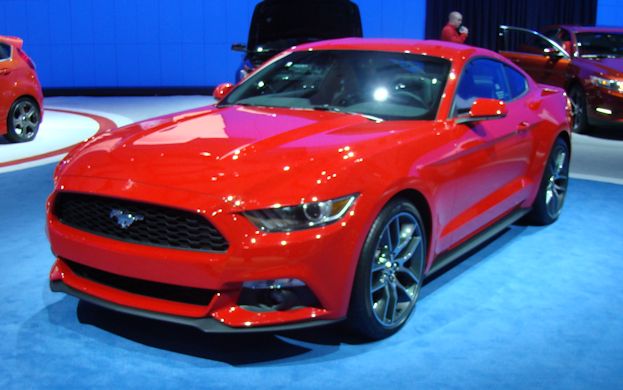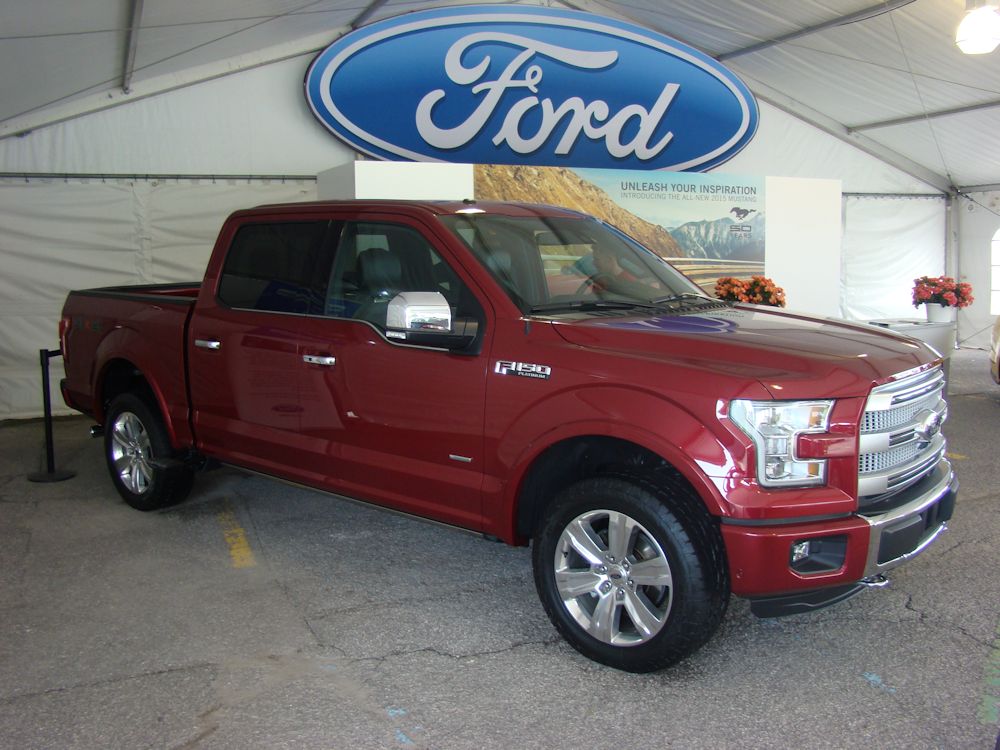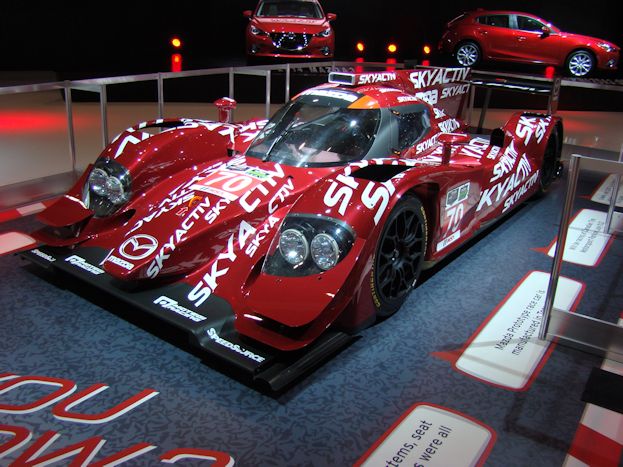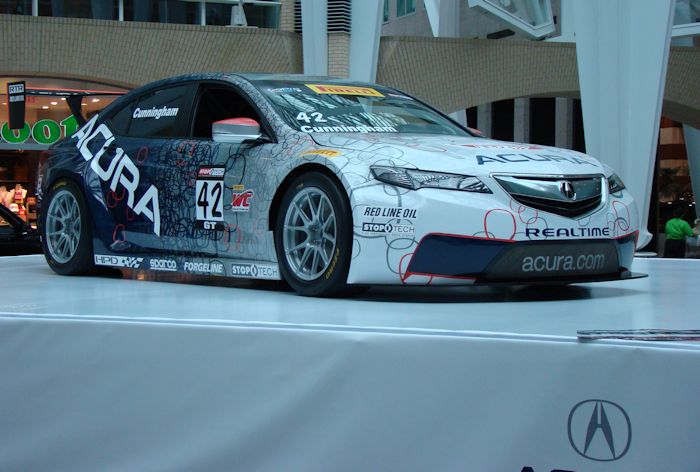 |
| Photo Credit: General Motors |
2014 is coming to a close providing what has been a year's worth of memories. As a follower of automotive culture, I have been highs and lows shaping what has been the past 12 months. The auto sector for 2014 consisted of exciting new designs, evolutions in technology and visions of a thrilling future. Conversely, some high-profile fails have also left a negative impression.
With the conclusion of 2014, I want to some automotive-related highlights for this year. The following is Car FYI's first grouping of
Most Spectacular Vehicle Launch of 2014: (Tie) 2015 Ford Mustang and 2016 Mazda MX-5 Miata
For 2014, despite all the movements in the realm of electric-powered driving and autonomous driving technology, the human driver has been rewarded handsomely. A new crop of gasoline-fuelled sports cars and high-performance vehicles has explored new heights in design as well as horsepower.
Arriving ahead of the Ford Mustang’s 50th anniversary, the 2015 version of the beloved pony car was a magnificent guiding light to the future of the vehicle as the past was being celebrated. Ingredients such as a 5.0-liter V-8 as well as hardtop and convertible variants of the 2015 Mustang won over enthusiasts. On the other hand, new Ford styling inspired by the Evos concept car and a four-cylinder EcoBoost engine has provided the American sports car with the meaningful adjustments to modern motoring times.
 |
| Photo Credit: Chris Nagy |
When I watched the unveiling of the new Mazda MX-5 Miata, I thought back to 2013 when Chevrolet created a major Sunday night stir launching the seventh-generation Corvette ahead of the North American International Auto Show. The reception for the Corvette Stingray flooded the Internet in a way rarely observed by an automobile. Mazda tried very hard to make the introduction of their latest iteration roadster strike the same note. In a live webcast accompanied by the legendary rock band Duran Duran, it is reasonable to say the 2016 Mazda MX-5 Miata was worth the fuss. Cutting-edge styling and Mazda’s SkyActiv technology gave the MX-5 Miata a refreshing bolder look.
Most Important Vehicle Launch of 2014: 2015 Ford F-150
While the Ford Mustang and Chevrolet Corvette Z06 attracted the most attention of cameras at the North American International Auto Show in Detroit, another American-made debut represented an important part of the automotive sector on this continent. The best-selling truck in the Unites States and Canada, the latest-generation half-ton version of Ford’s F-Series line unveiled earlier this year contained a rich assortment of new technology rethinking the way we see the typical pickup truck.
 |
| Photo Credit: Chris Nagy |
While recent decades scrubbed the image of a pickup trucks being thin on innovation compared to cars, the 2015 Ford F-150 is a massive step forward. Aluminum body panels considerably reduce the weight of the new F-150 allowing it to more efficiently work. A diverse four-powerplant line-up now features two powerful yet fuel-efficient EcoBoost engines. An eight-cylinder powerplant remains the cream of the F-150 crop. A 385-horsepower 5.0-liter V-8 with the 2015 F-160 touts a 16 percent greater power-to-weight ratio than the previous truck.
The 2015 Ford F-150 represented an interesting conflict; evolve the half-ton pickup truck in order to maintain status quo popularity. Fortunately, for Ford and the new F-150, interest in the new aluminum truck philosophy appears to be strong.
Most Stunning Concept Car: Chevrolet Chaparral 2X VGT
At the 2014 Los Angeles Auto Show, the world was introduced to a Chevrolet concept car creation we can certifiably say in confidence is not production-bound. Exploring the full flexibility afforded to a concept car, Chevrolet’s Chaparral 2X VGT is not designed for this world; it’s built for the virtual world of Gran Turismo 6 on the Sony Playstation 3. Features found with the Chaparral 2X VGT include active aerodynamics and is moved by an electric-charged, 900-horsepower laser beam-energy propulsion system.
2014 Concept Car Most Desired for Production: Infiniti Q50 Eau Rouge
Unveiled at the Detroit show, the Infiniti Q50 Eau Rouge presented a four-door sedan concept remodelled through a host of Formula 1 inspired touches and a Nissan GT-R powerplant. Working with corporate partner Red Bull Racing, a Q50 sedan received carbon fiber exterior pieces, 20-inch forged alloy wheels and a performance-themed steering wheel fitted with Formula 1 paddle shifters. The centerpiece of the Q50 Eau Rouge was a 560-horsepower, 3.8-liter twin-turbocharged V-6 engine borrowed from Nissan’s supercar. This sport luxury sedan concept displayed by Infiniti was tailored as a fighter against the BMW M5 and Mercedes-Benz E63 AMG.
 |
| Photo Credit: Nissan/Infiniti |
Based on the composition of the Infiniti Q50 Eau Rouge, the concept vehicle appeared to be on the fast track to production if public demand dictated. Indeed popular, the Q50 Eau Rouge first viewed as a production reality during the summer of this year. However, an issue regarding the usage of the Eau Rouge name and recent hints that Infiniti has lost interest in the 560-horsepower sport sedan has potentially derailed the Q50 Eau Rouge. In the final days of this year, questions swirl whether the Infiniti Q50 Eau Rouge will have a future or will be dropped like the ball in New York’s Times Square.
Biggest Blunders by an Auto Company: (Tie) GM Ignition Recall and Chrysler/FCA Shakedown of Canadian Governments
Unfortunately, no highlight of 2014 can go without mention of the General Motors ignition switch bombshell. Affecting roughly 29 million vehicles sold by General Motors from 1997 to 2014, a simple keychain can result in vehicles shutting off without notice to the motorist. The ignition switch flaw has proven fatal linked to 38 deaths as of December with at least two deaths occurring in Canada. An avalanche of damning information such as how long General Motors was aware of the ignition problem was enough to gain attention from the United States congress. While the US federal government levied a hefty 35 million-dollar fine against GM, Canadian governments have not taken any similar actions. It is not entirely clear what effect this major recall is having to their current automotive sales. While numbers have not deteriorated heavily, some buyers may be turned away from GM brands.
A completely different, less troubling topic, I also want to acknowledge another public relations blunder in Canada itself. Fiat Chrysler Automobiles’ attitude in acquiring funding from the Canadian provincial and federal governments as assurance for future production attracted a lot of attention earlier this year. A matter of days before the 2014 Canadian International AutoShow, it was announced FCA was seeking an astronomical amount between 700 and 800 million dollars of government support for their Windsor and Bramalea assembly plants. While government aid to business is practically commonplace in any part of this economic world, FCA asked for a sizable sum by comparison to recent deals with Ford Motor Company and Honda. Part of Ford’s $700-million upgrade to their Oakville plant that included the continuing production of the Edge crossover vehicle, $142-million was provided from the government. In what turned out to be an even better deal, Honda’s $857-million upgrade to their Alliston operations required 10 percent from the Government of Ontario.
At the 2014 Canadian International AutoShow in Toronto, FCA chairman Sergio Marchionne served as the keynote speaker opening media day. Surprisingly (unsure if it was a matter of stubborn bravery or a miscalculated overconfidence), Marchionne participated in a Q&A session where just one topic was on the mind of reporters. Asked to defend his company’s funding request, the FCA chairman suggested how other regions have been luring business with considerable deals. To me, that came off as a not-so subtle way of saying FCA will move their Canadian operations unless they get what they request. It’s disappointing since this fails to emphasize the proven dedication and competence of Canadian workers. FCA later retracted their requests but this recent action has made the company’s future in Canada less certain.
Biggest Broken Promise by an Automaker: Mazda’s Diesel Production Car Launch in United States and Canada
 |
| Photo Credit: Chris Nagy |
When Mazda previewed the 2012 Mazda6 several years ago, the Japanese based auto company expressed their intentions to bring a diesel powerplant to the North American marketplace. Branded as the SkyActiv-D, Mazda’s diesel engine was available in the European market where alternative fuel to gasoline is highly popular. As for North America, a diesel-powered Mazda6 would be the first car of its type sold by a Japanese auto brand. During the gas price spike of 2008, Toyota and Nissan were both rumoured to have considered selling diesel-engined passenger cars in the United States but neither company followed through with concrete results.
Scheduled for release for the 2014 model year Mazda6 as well as the CX-5 crossover utility vehicle, a 2.2-liter SkyActiv-D twin-turbocharged engine boasted the potential of producing V-8 torque while providing fuel economy equal to a hybrid. Despite promoting their devotion to diesel technology in North America (promotion that included competing in professional sports car racing), the SkyActiv-D engine is not available in dealerships in the United States or Canada as the year closes. Mazda did announce a delay in the development of their diesel engine for the North American market and has not removed mention of the SkyActiv-D from their websites. Some sources now say it could be 2015 or 2016 when the diesel powerplant will be available on Mazda products.
Most Uninspired Car Brand: Acura
It has been no secret in recent years that Honda product line-ups could be described as “styling challenged”. In honesty, the Honda auto company has not historically been a design leader for production cars. Focused on solid powertrains, Honda and Acura brands were long regarded as technologically-advanced through V-TEC engines. As engine development of other auto companies evolved, Honda’s advantage has been eroded. Competing against their ideologically of building solid vehicles, that planning his placed design and high-tech toys on the backburner. For 2014, it’s a shame to see Acura has appeared too grounded in Honda’s general approach to automotive engineering.
Maintaining a technological pace with other luxury brands through the inclusion of Super Handling all-wheel drive, LED headlights and a dual-clutch transmission in their vehicles, Acura is not seen as a leader in any aspect of premium motoring. A handsome, sporty sedan, the high-anticipated introduction TLX largely retains the vanilla image of Acura. Maybe following the polarizing existence of the ZDX crossover, Acura has lost its nerve in creating something dramatic.

In a few weeks time, Acura will officially announce the revival of the NSX with a full-fledged production model. Though the gasoline/electric hybrid is eagerly awaited, Acura’s three-year tease of the supercar has watered-down some of the excitement since the road-going version’s specs have largely been unveiled by several concept cars. However, the presence of a new Acura NSX could only be a positive for roads of the world.

Comments
Post a Comment